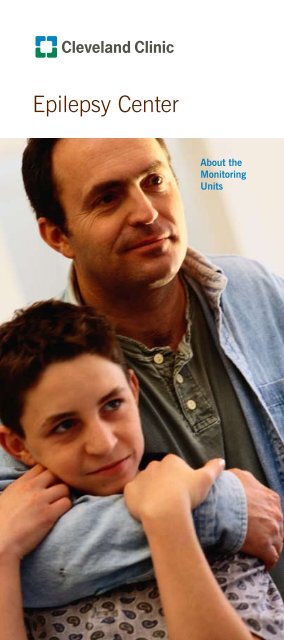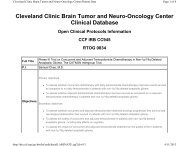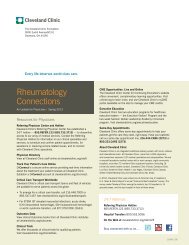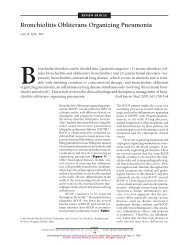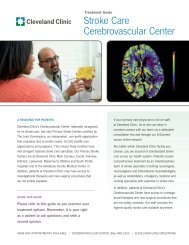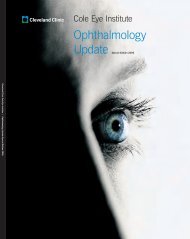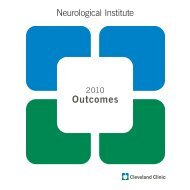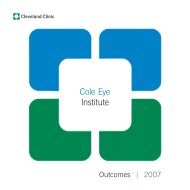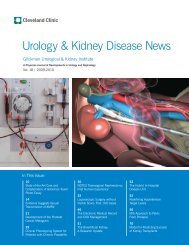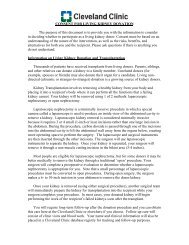Epilepsy Center - Cleveland Clinic
Epilepsy Center - Cleveland Clinic
Epilepsy Center - Cleveland Clinic
Create successful ePaper yourself
Turn your PDF publications into a flip-book with our unique Google optimized e-Paper software.
<strong>Epilepsy</strong> <strong>Center</strong><br />
About the<br />
Monitoring<br />
Units
<strong>Cleveland</strong> <strong>Clinic</strong> <strong>Epilepsy</strong> <strong>Center</strong><br />
The <strong>Cleveland</strong> <strong>Clinic</strong> <strong>Epilepsy</strong> <strong>Center</strong>, established in<br />
1978, is a national and international pacesetter in<br />
the treatment of epilepsy in both children and adults.<br />
A team of dedicated physicians, health care<br />
professionals and support staff participate in the<br />
evaluation and treatment of our epilepsy patients<br />
who come here from across the country and<br />
around the world. More than 200 epilepsy surgical<br />
procedures are performed at <strong>Cleveland</strong> <strong>Clinic</strong><br />
each year.<br />
The <strong>Cleveland</strong> <strong>Clinic</strong> <strong>Epilepsy</strong> <strong>Center</strong> meets and<br />
exceeds guidelines for both fourth-level medical<br />
and fourth-level surgical epilepsy centers, the<br />
highest levels set forth by the National Association<br />
of <strong>Epilepsy</strong> <strong>Center</strong>s.
At <strong>Cleveland</strong> <strong>Clinic</strong>, we have two <strong>Epilepsy</strong> Monitoring Units<br />
– one dedicated to adults and another in our Children’s<br />
Hospital reserved for our pediatric patients. These are unique<br />
areas designed for round-the-clock patient monitoring.<br />
In the Monitoring Units, our staff uses both EEG (electroencephalography)<br />
equipment to monitor brain activity and<br />
video cameras to record body movements during a seizure.<br />
This approach gives us a much greater understanding of seizures<br />
than would using either technique alone. The monitoring<br />
allows us not only to diagnose a seizure problem accurately,<br />
but also to design the best possible treatment plan.<br />
Patients are monitored in the unit throughout the day and<br />
night. The length of time people spend in the unit varies<br />
but usually ranges from three to seven days. Although this<br />
leaves little private time, it is the most effective way to study<br />
seizures and record information that will help us treat<br />
our patients.<br />
The admission process begins when your doctor decides that<br />
prolonged video-EEG monitoring would be useful in evaluating<br />
your seizures or epilepsy. Your name then will be placed<br />
on a waiting list for admission to the unit. As we anticipate<br />
discharges, we notify potential patients that space will be<br />
available. We try to give patients as much advance notice<br />
as possible.<br />
<strong>Epilepsy</strong> Monitoring Unit Staff<br />
You will be cared for by a number of different staff during<br />
your stay in the Monitoring Unit. Feel free to ask questions<br />
of any of us.<br />
Epileptologists: Neurologists specializing in epilepsy, known<br />
as epileptologists, are in charge of your medical care. They<br />
will order your medications and interpret the results of your<br />
video-EEG recordings. These staff physicians rotate coverage<br />
of the <strong>Epilepsy</strong> Monitoring Units for one- or two-week periods,<br />
so the doctors you see may change during your admission.<br />
Regardless, the doctor on duty always is in close contact<br />
with the physician in charge of your overall care. Physicians<br />
undergoing advanced training in neurology or epilepsy, known<br />
as residents or fellows, along with physician assistants and<br />
nurses, also will be part of the monitoring team.<br />
Registered nurses: Our nurses have primary responsibility for<br />
the daily care of patients and for managing the units. They can<br />
answer questions not only about what to expect during your<br />
stay in the unit, but also about epilepsy in general.
EEG technologists: Our EEG technologists are responsible<br />
for obtaining accurate recordings and videos. The EEG technologists<br />
can answer technical questions about your recordings<br />
or direct your questions to the proper person.<br />
When You Arrive For Monitoring<br />
When you arrive at <strong>Cleveland</strong> <strong>Clinic</strong>’s <strong>Epilepsy</strong> Monitoring<br />
Unit, a staff member will orient you to the area and a nurse<br />
will conduct an admission interview with you. The nurse,<br />
a specialist in epilepsy care, will ask about your past and<br />
present medical history, as well as your daily routines and<br />
lifestyle. These questions may seem personal, but they will<br />
help us plan your care while you are in the unit.<br />
An EEG technologist will explain our recording procedures<br />
to you. The technologist will connect the various electrodes<br />
used to monitor your brainwaves. The electrodes will stay in<br />
place on your scalp during your entire stay in the unit. Once<br />
the electrodes are in place, they are connected to recording<br />
amplifiers, and the video camera is adjusted. All of these<br />
devices are connected to a computer that helps us collect,<br />
analyze, save and recall large amounts of data about each of<br />
our patients.<br />
You will spend several days being monitored. EEG technologists<br />
and nurses staff the Monitoring Units to observe<br />
patients. Because they can see and hear you, these experts<br />
are available to respond when a seizure occurs.<br />
To ensure we record a seizure while you are in the<br />
Monitoring Unit, it is often necessary to lower the dosage or<br />
stop the anticonvulsant medication you are taking. Please be<br />
aware that when medications are reduced, you may experience<br />
different types of seizures, some of which your family<br />
may not have witnessed before.<br />
Most of the time you will stay in bed or in a reclining chair<br />
next to your bed. You will be disconnected from the equipment<br />
to get up and move about twice a day. You also will be<br />
disconnected to use the restroom and to shower. Having a<br />
family member or staff person accompany you on all walks<br />
is required for your safety as your medication has been<br />
reduced or discontinued. For your safety, we also limit your<br />
walking to within the unit itself.<br />
When showering, a staff or family member needs to be<br />
seated in the hallway near the shower for your safety. Handheld<br />
shower attachments are provided to prevent the electrodes<br />
and head-wrap (dressing) from getting wet.
We recommend you wear comfortable street clothes such as<br />
button-down, loose-fitting or short-sleeve shirts, and shorts or<br />
sweatpants. You need not wear a hospital gown in the unit.<br />
About Your Room<br />
All monitoring rooms are private, each with its own telephone<br />
and direct-dial number. Outgoing long-distance calls<br />
may be placed (as collect calls) by contacting the <strong>Clinic</strong><br />
operator or by charging them to a telephone calling card.<br />
Each room has a television with regular and cable programming.<br />
VCRs and DVD players are available at no charge.<br />
Feel free to bring in movies of your choice.<br />
For Our Young Patients<br />
We try to be especially understanding of our young patients’<br />
concerns and accommodate them in every possible way.<br />
<strong>Cleveland</strong> <strong>Clinic</strong>’s Pediatric Monitoring Unit is designed<br />
especially to meet the needs of children with seizures. Child<br />
Life workers are available to help prepare children emotionally<br />
for their hospital stay, for all procedures, and if necessary,<br />
for surgery.<br />
Children are encouraged to bring along their favorite blankets,<br />
toys, books, pacifiers or other comfort items. Feel free<br />
to bring any photographs, pictures or small items that will<br />
make your child’s room seem more like home. Parents are<br />
encouraged to stay around-the-clock with their child, though<br />
only one person may stay overnight.<br />
After monitoring is completed, young patients are welcome<br />
to use the playroom and playdeck in the <strong>Cleveland</strong> <strong>Clinic</strong><br />
Children’s Hospital, where the Pediatric Monitoring Unit is<br />
located.
Activities For Patients And Families<br />
Patients and family members bring many different items to<br />
the unit to help pass the time. We suggest puzzles, books,<br />
magazines, card games, hand-held computer games, craftwork<br />
or hobby projects such as needlepoint, cross-stitch or<br />
embroidery. VCRs and DVD players are available. You may<br />
bring a selection of movies from home. You may also bring<br />
your laptop computer, provided you have a LAN cable.<br />
Visiting Policy<br />
There are no visiting restrictions on our <strong>Epilepsy</strong> Monitoring<br />
Units. Friends and family may stay with patients whenever<br />
they wish. There may be times, however, when visitors are<br />
asked to leave the room for short periods. Overnight stays by<br />
one visitor/family member are encouraged in the units. We<br />
recommend that one parent stay with a child each night of<br />
his or her hospitalization. The visitor, family member or parent<br />
may sleep on a special reclining lounge chair or cot. This<br />
policy can be explained fully at the time of admission.<br />
Services For Family Members<br />
A lounge for parents is located on the third floor of <strong>Cleveland</strong><br />
<strong>Clinic</strong> Children’s Hospital in Area M.<br />
About <strong>Cleveland</strong> <strong>Clinic</strong><br />
Children’s Hospital<br />
<strong>Cleveland</strong> <strong>Clinic</strong> Children’s Hospital provides innovative care<br />
for children with serious and complex medical problems.<br />
More than 100 pediatric specialists and subspecialists provide<br />
state-of-the-art care.<br />
The Children’s Hospital has medical, surgical, psychiatric<br />
and intensive care beds, and offers the latest technology,<br />
including the computerized Pediatric <strong>Epilepsy</strong> Monitoring<br />
Unit, a level III NICU, a PICU and dedicated pediatric operating<br />
suites.<br />
The Pediatric and Congenital Heart <strong>Center</strong> comprises the<br />
departments of Pediatric Cardiology and Pediatric and<br />
Congenital Heart Surgery. The center offers multidisciplinary<br />
evaluation and treatment for infants and children, as well<br />
as adults. Pediatric psychologists provide consultation and<br />
intervention to address developmental, behavioral and emotional<br />
issues in children hospitalized for a wide range<br />
of acute and chronic illnesses.<br />
For more information, please visit our Web site at
www.clevelandclinic.org/pediatrics. Shower and laundry<br />
facilities are available. Family members and guests may<br />
order a guest tray at a fixed price to be delivered to their<br />
child’s room at the same time as their child’s meals. Ask<br />
your nurse for information on how to order. Visitors also may<br />
bring food from home, <strong>Cleveland</strong> <strong>Clinic</strong> cafeterias or local<br />
restaurants and enjoy meals together in the patient’s room.<br />
When Monitoring Is Complete<br />
When your monitoring is complete, the doctor will discuss<br />
the findings with you and your family, explaining whether<br />
further diagnostic tests are needed and what treatment is<br />
best for you. The nursing staff will work with you to ensure<br />
you understand your testing and treatment programs. Please<br />
be sure to ask any questions you have about any aspect of<br />
your diagnosis and treatment.<br />
Most of our patients receive various medications to control<br />
their seizures. Therefore, after monitoring is completed, a<br />
few additional days of hospitalization may be needed during<br />
which medications are readjusted. This may take place in<br />
the Monitoring Unit or on one of the hospital’s regular neurology<br />
or pediatric nursing floors.<br />
Appointments<br />
We encourage you to see your neurologist or epileptologist<br />
at <strong>Cleveland</strong> <strong>Clinic</strong> <strong>Epilepsy</strong> <strong>Center</strong> and/or your local doctor<br />
on a regular basis. Often the two will work together in caring<br />
for you.<br />
To schedule an appointment with a <strong>Cleveland</strong> <strong>Clinic</strong> <strong>Epilepsy</strong><br />
<strong>Center</strong> specialist, please call toll-free 1.866.374.5624. For<br />
more information, please visit our Web site at www.clevelandclinic.org/neursocience.
MKT 06-NEU-036<br />
9500 Euclid Avenue, <strong>Cleveland</strong>, OH 44195<br />
The <strong>Cleveland</strong> <strong>Clinic</strong> Foundation is an independent,<br />
not-for-profit, multispecialty academic medical<br />
center. It is dedicated to providing quality specialized<br />
care and includes an outpatient clinic, a hospital<br />
with more than 1,000 available beds, an education<br />
division and a research institute.<br />
© The <strong>Cleveland</strong> <strong>Clinic</strong> Foundation 2006


